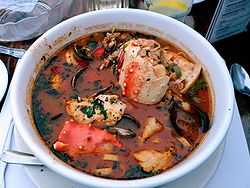Cioppino
| Cioppino | |
|---|---|
 | |
| Type | Fish stew |
| Place of origin | United States |
| Region or state | San Francisco |
| Main ingredients | Seafood (Dungeness crab, clams, shrimp, scallops, squid, mussels), fish, tomatoes, wine |
|
| |
| Wikibooks Cookbook has a recipe/module on |
Cioppino is a fish stew originating in San Francisco, California. It is considered an Italian-American dish, and is related to various regional fish soups and stews of Italian cuisine.[1]
Description
Cioppino is traditionally made from the catch of the day, which in San Francisco is typically a combination of Dungeness crab, clams, shrimp, scallops, squid, mussels, and fish all sourced from the Pacific Ocean. The seafood is then combined with fresh tomatoes in a wine sauce, and served with toasted bread, either local sourdough or French bread.
History
Cioppino was developed in the late 1800s primarily by Italian fishermen who settled in the North Beach neighborhood of San Francisco, many from the port city of Genoa.[2] Originally it was made on the boats while out at sea and later became a staple as Italian restaurants proliferated in San Francisco.
The name comes from ciuppin, a word in the Ligurian dialect spoken in Genoa meaning "to chop" or "chopped," which describes the process of making the stew by chopping up various leftovers of the day's catch.[1] Ciuppin is also the name of a classic soup from the region, similar in flavor to cioppino but with less tomato and using Mediterranean seafood cooked to the point that it falls apart.
The dish also shares its origin with other regional Italian variations of seafood stew (zuppe di pesce ) similar to ciuppin, including cacciucco from Tuscany, brodetto from Abruzzo, Quatàra di Porto Cesareo , and others.[1][2][3] Similar dishes can be found in coastal regions throughout the Mediterranean, from Portugal to Greece. Examples of these include suquet de peix from Catalan-speaking regions of coastal Spain and bouillabaisse from Provence.
Presentation
Generally the seafood is cooked in broth and served in the shell, including the crab, which is often served halved or quartered. It therefore requires special utensils, typically a crab fork and cracker. Depending on the restaurant, it may be accompanied by a bib to prevent food stains on clothing, a damp napkin, and a second bowl for the shells. A variation, commonly called "lazy man's cioppino," is served with shells pre-cracked or removed.[4]
Recipes
Gianni's North Beach (video plus text): Cook presents the dish as a Christmas Eve stew.
See also
References
- ↑ 1.0 1.1 1.2 Riely, Elizabeth (1988-04-24). "Cioppino: Fish Stew From the Pacific". New York Times. Retrieved 2007-09-26.
- ↑ 2.0 2.1 Oseland, James (November 11, 2011). "Local Favorite: Cioppino". Saveur. Retrieved 2013-08-14.
- ↑ Smith, James R. (2004). San Francisco's Lost Landmarks. Sanger, CA: Linden Pub. ISBN 978-1-6103-5191-1. Retrieved 2013-08-16.
- ↑ 1001 Foods to Die For. Kansas City, Mo.: Andrews McMeel. 2007. p. 143. ISBN 0-7407-7043-8.